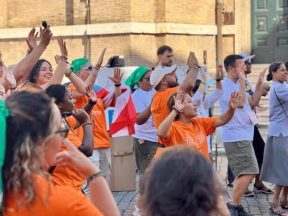Ethiopia. The Church in Gumuz. Commitment to Peace.
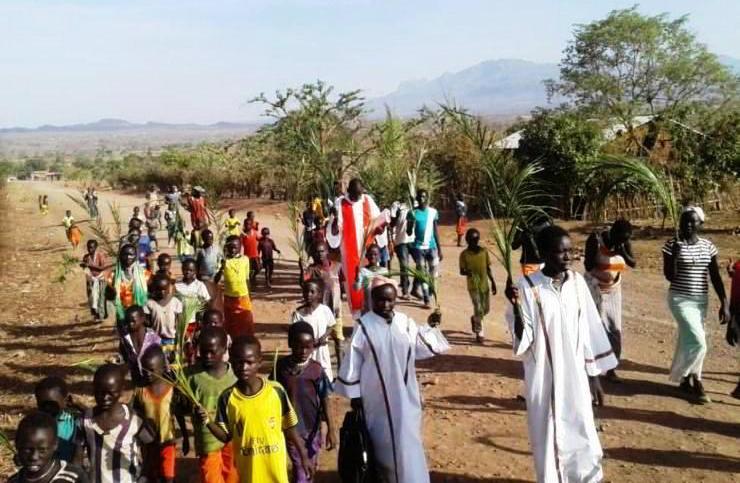
Despite the signing of the peace agreement between the regional government and insurgent groups, the situation in the Benishangul-Gumuz region remains very tense. The Church’s commitment to justice and reconciliation. Father Isaiah Sangwera Nyakundi, a Comboni Missionary who lives in the area, writes.
Benishangul-Gumuz Regional State is located in the western part of the country, in the Metekel area, bordering the Amhara Region to the north and northeast, Oromia and Gambella Regions to the south and southeast, and Sudan to the west. The regional capital Assosa is located about 680 kilometres west of Addis Ababa. The majority of the inhabitants are ethnic Gumuz, a people of Nilotic origin, small in number (about 200,000) but covering a vast territory and today inhabiting
both Ethiopia and Sudan.
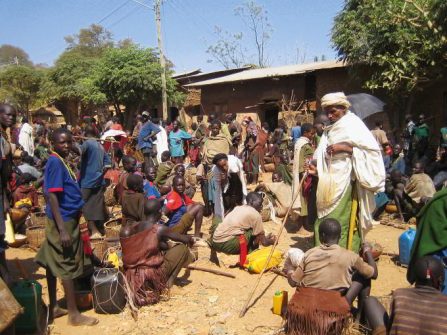
Gublak. Market day. “We are encouraging people to live in unity and peaceful coexistence”. File swm
The Gumuz have remained on the margins of Ethiopian society for many centuries. In recent decades, they have gained their rights and control over their land and political responsibility following the promotion of their elite in the management of power.From an agro-climatic point of view, most of the region is located between 580 and 2730 meters above sea level. It is endowed with enormous natural resources, including forests, agricultural land and water.
The Catholic Church
The first Catholic mission in the region was opened in 2000 by the Comboni Missionary Sisters in Mandura. The Comboni Missionaries followed them and opened two apostolic communities in Gilgel Beles in 2003 and Gublak in 2011. Benishangul-Gumuz is an area of first evangelisation and commitment to human promotion and development, carried out especially in the education and health sectors.
In 2019, the region, like several other regions of Ethiopia, was the scene of fighting between the government and the Benishangul People’s Liberation Movement (BPLM) and the Gumuz People’s Democratic Movement (GPDM) which put the life of the population to the test.
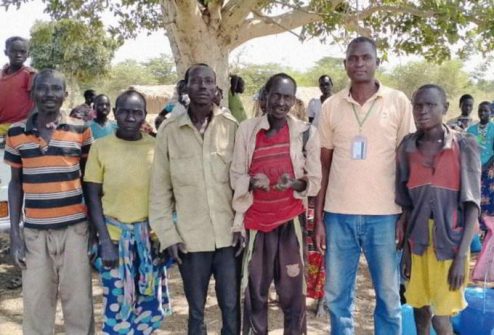
Father Isaiah with some Christian Gumuz. “We are aware that the gospel we have tried to share has not reached the depths of Gumuz culture”. File swm
The Catholic mission of Gublak was the most affected and suffered the most serious consequences of the conflict. When the fighting broke out, people were forced to flee for safety. As the situation worsened, we missionaries were also forced to leave the area. People in general, but also our Christian communities, experienced insecurity, instability, looting, killings, and several young Catholics joined the insurgents.
After our return in 2022, we focused our work on encouraging people to live in unity and peaceful coexistence. We resumed organizing Christian-human formation courses at all levels, encouraging ecclesial leaders and the faithful to deepen their faith, knowledge of the word of God and the identity of the Catholic Church. Being prophetic today in Ethiopia requires a serious commitment in the fields of justice, peace and the promotion of human rights.
After more than twenty years of presence, we are aware that the Gospel we have tried to communicate has not reached the depths of the cultural fabric of the Gumuz, and a poor respect for human life and a strong sense of revenge have prevailed during this time.
Last June, The Benishangul-Gumuz regional government formally declared the “successful conclusion” of peace agreements with the remaining elements of the Gumuz People’s Democratic Movement (GPDM) and the Benishangul People’s Liberation Movement (BPLM).
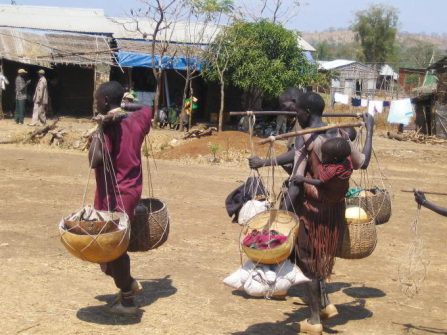
A Gumuz family going back home. People do not trust the regional authorities. File swm
After the peace agreement, the regional government called on Gumuz families to abandon their hiding places and settle in some specially prepared sites.Many families accepted the invitation despite the inconvenience caused by the lack of basic services in the designated locations. However, people do not trust the regional authorities.There are still fringe groups of insurgents that are strengthening their presence in some villages around the Mandura district and launching sporadic attacks against government militias. In mid-January, the army responded by launching a special operation that led to the killing of the insurgent leader. A few days later, in retaliation, a public transport vehicle travelling between the cities of Gilgel Beles and Chagni was attacked, causing dozens of victims. A concrete sign that true pacification has not yet been achieved.
In this context, we are convinced that the efforts and resources of the Church must be used to prepare lay workers through serious education and ongoing training in a local Church to be transformed into an authentic “School of education for peace”.We, therefore, propose to ensure that programs of education, formation and sacramental initiation find a connection with the great theme of peace whenever possible, emphasising concrete ways for all the faithful, from children to young people to adults, to embody these teachings in their relationships with each other and in the society of which they are a part.
Interreligious dialogue and inculturation
Another priority theme for our pastoral activity is interreligious dialogue. From a geographical point of view, some of our Christian communities in Benishangul-Gumuz border Sudan. Consequently, the Islamic religion has a great influence on the lives of our populations. The conflict of recent years has brought to light the fact that religion can sometimes be a source of conflict and division.
We have noticed since our return that the construction of new mosques in the villages of the Gumuz is multiplying.
The workers are often Muslims, even from other countries, with evident proselytising intentions and radical and aggressive attitudes.
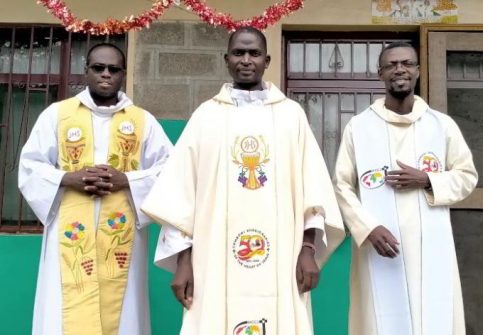
Comboni Community in Gublak. “We are aware of how evangelisation is a complex and dynamic reality”. File swm
In many cases, they use the distribution of material aid or money to attract people, in contrast to what is done in our missions, where humanitarian aid has always been and still is given unconditionally and independently to everyone, without regard to religious or ethnic affiliations. We are convinced that religious practice in its various expressions can play an important role in promoting encounter, mutual acceptance and peace.
As regards the pastoral urgency of inculturating the Gospel by expressing it through the traditional values of the Gumuz, we are very grateful to the first missionaries who have taken positive steps in this area. We intend to continue to collaborate with the local Church in the production of liturgical and catechetical material.
We are aware of how evangelisation is a complex and dynamic reality. We Comboni missionaries in Gumuz today, are invited to remember the past with gratitude, to live the present with enthusiasm and to look to the future with confidence.Our work, our commitment, and our journey as “pilgrims of hope” continue in this jubilee year in the search for new ways of evangelisation. (Open Photo: Palm Sunday procession with children. File swm)



